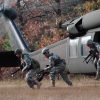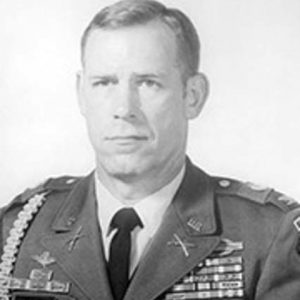calsfoundation@cals.org
Thomas Elwood Blagg (1934–2023)
Tom Blagg was a career soldier and intellectual with diverse talents. In two stints in the Vietnam War, he displayed courage and leadership that were especially evident in 1964, when he led his troops to victory in fierce fighting against a larger enemy force. As a professor at the U.S. Military Academy, Blagg taught cadets to write clear, coherent sentences and to appreciate literary masterpieces like Geoffrey Chaucer’s The Canterbury Tales. When the Pentagon needed a detail-savvy officer to organize a presidential inauguration parade, Blagg got the call. Along the way, Blagg befriended Colin Powell, who wrote fondly about their association in his memoir. They served together in the 1970s as colonels commanding brigades of the 101st Airborne Division. Later, they both were assigned to the Fourth Infantry Division at Fort Carson, Colorado, where their commanding general put less-than-glowing evaluations in their personnel files, leading Blagg to retire.
Thomas Elwood Blagg was born in Prairie Grove (Benton County) on October 20, 1934, the third of John and Marietta Blagg’s eight children. In the early 1940s, the family moved to Little Rock (Pulaski County), where Blagg’s father worked as a butcher and as an employee of Dillaha Fruit Company. In 1952, Blagg graduated from Little Rock High School, now Central High, where he was tutored as a tackle by Wilson Matthews, who won ten state championships in the eleven years he coached the football team.
Blagg attracted a scholarship offer from Forrest “Frosty” England, who had gained recognition in small-college circles for his team at Arkansas State College (now Arkansas State University). Although England left for Toledo University after Blagg’s sophomore year, Blagg continued to anchor the line under the two coaches who succeeded him.
Blagg, an avid reader, excelled in the classroom. He majored in journalism and was editor of the school newspaper. Eventually, however, he focused on the Reserve Officers’ Training Corps (ROTC), aiming for a regular army commission. During his final semester in 1956, he was the cadet colonel commanding the ROTC regiment. At commencement, he was commissioned an infantry second lieutenant.
Early in his military career, Blagg earned paratrooper and Ranger badges and a Green Beret. His first assignment to Vietnam was as a Special Forces adviser. On August 30, 1964, Captain Blagg was leading a thirty-man South Vietnamese patrol seeking to intercept North Vietnamese soldiers crossing the Song So Ha River from Cambodia into Vietnam. As the patrol approached the river, it was ambushed by a battalion-sized North Vietnamese unit. His interpreter was badly wounded in the initial fighting, but Blagg strapped him on his back so the interpreter could continue to relay his orders. Blagg radioed his Special Forces camp to summon reinforcements. According to the citation that accompanied an award of the Silver Star, the fight became hand to hand, and Blagg “was wounded in the face and his right arm was shattered.” Once the reinforcements arrived, Blagg “reversed the tide of battle by launching an attack….Not until the battle had been fought and won was Captain Blagg evacuated for medical treatment.”
When Blagg recovered from his wounds, the army sent him to Indiana University to get a master’s degree in English. That equipped him for his assignment, in 1969, of teaching English composition and literature at the U.S. Military Academy.
Lieutenant Colonel Blagg was eager to get back to Vietnam, and in 1971 he was deployed as commander of an infantry battalion in the First Cavalry Division.
Blagg’s next assignment was running the military’s segment of the 1973 inaugural parade for Richard M. Nixon’s second term. As parade preparations went on, Blagg met frequently with officials at the White House, including several who would figure in the Watergate coverup that led to Nixon’s resignation in 1974.
Blagg graduated from the Army War College in Carlisle Barracks, Pennsylvania. He then went to Fort Campbell, Kentucky, as a brigade commander in the storied 101st Airborne Division. A full colonel and decorated combat veteran, Blagg got a coveted assignment—chief of staff for one of the army’s seventeen divisions, a job regarded as an audition for promotion to brigadier general.
The commanding general of Blagg’s new unit, the Fourth Infantry Division, was Major General John W. Hudachek, who was known to take offense when senior subordinates told him about problems in the division that needed fixing. When Colin Powell, by then a brigadier general, arrived at Fort Carson as the deputy commanding general, Powell soon sought Blagg’s opinion. As he related in My American Journey, Powell told Blagg he planned to go to Hudachek with advice he did not think the commander wanted to hear. The book quoted Blagg’s response: “Don’t do it. Because it’s not a problem Hudachek can discuss or even admit. I’m warning you—you won’t help him. And you might hurt yourself.” But Powell decided he had a duty to deliver the advice, leading Hudachek to write off Powell as less than a team player. Later, when Hudachek delivered Powell’s annual efficiency report, he essentially described his deputy—who ultimately would be the nation’s highest ranking military officer—as unsuited for command.
Although other officers in the division admired Blagg’s performance as chief of staff—“the Chief,” as he was affectionately known—Hudachek also gave Blagg a damaging efficiency report, one that Blagg said “damned me with faint praise.” He decided to resign from the army. When seven general officers told Blagg they could get his career back on track, Blagg said: “Forget it. I’m done.” He retired as a colonel after nearly twenty-seven years on active duty. In addition to the Silver Star, he had earned two Purple Hearts, the Bronze Star, and two Legion of Merit decorations.
In the early 1980s, he and his wife, Billy, moved from Colorado Springs to Gunnison. There he directed the Western State College Foundation, raising money for the college (now Western Colorado University), and later became director of the school’s physical plant. In 1990, the Blaggs moved back to Colorado Springs, where he spent a decade teaching English at Pikes Peak Community College (now Pikes Peak State College).
Tom and Billy Blagg met and married while students at Arkansas State. When she died, they had been married sixty-four years. They had three daughters, Leah Ash, Melanie Maxwell, and Aimee Van Ausdall.
Blagg died in Colorado Springs on January 22, 2023. When his obituary was posted online, one of the tributes came from retired Lieutenant General Robert T. Clark, who had been a junior officer in the infantry battalion Blagg commanded in Vietnam. Clark wrote, “I never met a better soldier/leader.”
For additional information:
Powell, Colin L., and Joseph E. Persico. My American Journey. New York: Random House, 1995, pp. 267–268, 271, 272.
“Thomas E. Blagg, Colonel, Silver Star.” Arkansas State University ROTC Hall of Heroes. https://www.astate.edu/a/military-science/hall-of-heroes/blagg-thomas/index.dot (accessed May 15, 2024).
Thomas Blagg Obituary, 1934–2023. https://obits.gazette.com/us/obituaries/gazette/name/thomas-blagg-obituary?id=39454767 (accessed May 15, 2024).
Gene Foreman
Philadelphia Inquirer (retired managing editor)
 Divergent Prosperity and the Arc of Reform, 1968–2022
Divergent Prosperity and the Arc of Reform, 1968–2022 Military
Military Thomas E. Blagg
Thomas E. Blagg 



Comments
No comments on this entry yet.